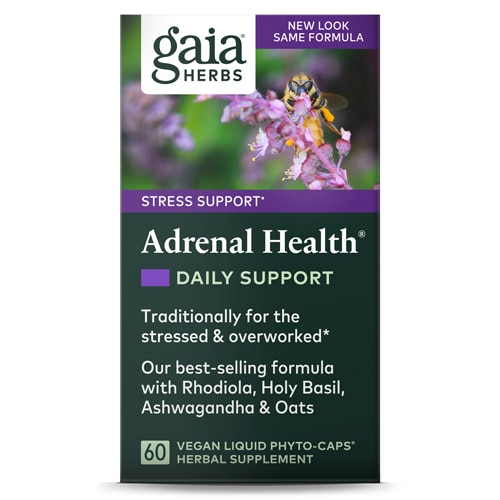[vc_row][vc_column][vc_column_text]It’s hardly a secret that the very word stress has become synonymous with a litany of problems, from
accelerated biological aging to difficulty concentrating.
And while a certain amount of
stress is actually beneficial for you—it boosts brain function and contributes to greater resilience and strength—chronic, unmanaged stress may lead what’s known as “adrenal fatigue,” an issue that has its
own subset of complications.

Sound familiar? Chances are high the phrase has been filling your social feed, or a friend or two has mentioned it after a particularly upsetting era. Or perhaps you heard Gwyneth Paltrow publicly announce that she suffers from it—she being one of several celebs with the condition.
Yet, what
is adrenal fatigue, exactly? And is it
real?
Let’s dive in.
What is adrenal fatigue—and what are the symptoms of it?
Adrenal fatigue, which was coined by James Wilson, PhD, in 1988, refers to a constellation of symptoms that, as you might imagine, are centered around exhaustion. These may include:
- Body aches and pains
- Depleted energy
- Mood swings
- Depression and anxiety
- Trouble falling asleep and trouble waking up
- Brain fog
- Sugar and salt cravings
- Weight changes
- Heightened sensitivity to stressors
Above all, though, adrenal fatigue is characterized by persistent and even overwhelming feelings of extreme tiredness.
What causes adrenal fatigue?
In two words,
chronic stress—and not of the positive, cognitive-enriching kind.
Whether you’re wrestling with emotional distress, mental pressure or physical strain, long-term, continual stress may tax your adrenals and result in the very symptoms just laid out.
New to the adrenals?
They’re a pair of vital glands that sit above your kidneys in your posterior abdomen like party hats. Also known as the suprarenal glands, they’re tasked with manufacturing several key hormones, including
androgens such as DHEA (which are precursors to testosterone and estrogens) and aldosterone. What’s more, they produce adrenaline and cortisol, or what many refer to as “stress hormones.” Together with several of your other organs and glands—like your pineal gland, pancreas, thyroid, and hypothalamus—they make up your endocrine system.
Importantly, your adrenal glands are partially responsible for managing a bevy of biological actions, including your:
- Immune function
- Metabolism
- Formation of sexual characteristics
As for the cortisol that your adrenals secrete? It’s in charge of curbing inflammation, moderating your blood pressure, managing your sleep-wake cycle, using the fats, proteins and carbohydrates you consume for energy, and sustaining your blood sugar levels.
Further,
cortisol, coupled with adrenaline, mightily assists with how you respond to stress. Indeed, your adrenal glands release these hormones during times of tension to not only bolster your brain power and prepare you for the “fight-or-flight” response but also to help you deal with emergencies. In other words? They’re
good, powerful hormones that we’ve all needed since the dawn of time.
But this is where adrenal fatigue and other issues come in.
When your body and brain are constantly under siege from stress, you release a prolonged
excess of cortisol and adrenaline and tire out your adrenal glands to the point that cortisol is no longer produced at the same level. Adrenal fatigue can then set in and leave you feeling as if you can’t muster the drive to get through the day, let alone face your stressors—whether it’s a demanding work schedule, the death of a loved one, caring for a sick child or parent, enduring a traumatic event or dealing with the after-effects of an illness.
What is the controversy behind adrenal fatigue?
For many alternative and naturopathic physicians and patients, there
is no controversy. Like all of the other organs and glands in your body, your adrenals can certainly get overloaded when you’re experiencing unremitting worry.
That said, given that there is no approved (at least currently) test that can assess adrenal production, it isn’t deemed a conventional medical condition but rather a collection of symptoms. (In fact, The Endocrine Society firmly states that adrenal fatigue isn’t a health issue but potentially emblematic of other underlying conditions or adrenal problems.)
And yet, those who have experienced it—and those who have treated it—realize that it’s far from a myth. Indeed, it’s believed that
almost 80% of adults in the U.S. will experience adrenal fatigue at some point in their lives.
How is adrenaline fatigue tested?
Should you choose to see a healthcare professional who takes a less-than-conventional approach to medicine, they may issue a blood test to examine how your adrenals are operating, a cortisol awakening response (CAR) test (which checks your cortisol levels upon awakening), or a saliva test that gauges your cortisol throughout the day. They may also check for DHEA, a hormone that’s also constructed in the adrenals, as low levels may point to adrenal fatigue.
Can adrenal fatigue be treated?
In sum,
yes—and we’ll turn to that topic below.
If you suspect you have adrenal fatigue, it’s first and foremost imperative to make an appointment with your trusted healthcare professional.
Why?
Because it’s crucial to ensure that you don’t have a different condition with similar symptoms, such as:
- Sleep apnea
- Iron deficiency
- Depression
- Hypothyroidism
- Fibromyalgia
- Chronic and acute conditions, like pneumonia, the flu, or bronchitis
- An autoimmune disease
- Genetic mutations
- Tumors
Additionally, it’s vital to rule out
Addison’s disease (or primary adrenal insufficiency), a health complication caused by damage to the adrenal glands that gives rise to insufficient cortisol and
aldosterone production. Another concern? The possibility of having secondary adrenal insufficiency, which is due to a pituitary gland “malfunction.” Both of these conditions need to be medically treated, as they could result in an adrenal crisis and even death.
This is where it gets tricky, as many of the signs of adrenal insufficiency overlap with adrenal fatigue. And yet, you may have the former if, in addition to the symptoms discussed above, you experience:
- Muscle weakness
- Weight loss
- Loss of appetite
- Stomach pain
- Hyperpigmentation (darkening of the skin)
- Low blood pressure
- Digestive issues, like nausea, vomiting, and diarrhea
How will your doctor determine the difference between adrenal fatigue and adrenal insufficiency? Through a blood or urine test aimed at (again) evaluating your cortisol levels.
Solutions to adrenal fatigue
With all of that said, after excluding other health conditions, your physician may urge your adrenal glands back into action through the following recommendations:
Up your intake of Omega-3s
Omega-3s can be a goldmine for those grappling with chronic stress (or simply going through a trying time): A 2021 study featured in
Molecular Psychiatry discovered that
supplementing with Omega-3 fatty acids supported healthy stress resilience, as well as healthy cortisol levels and inflammatory response.
† You can either reach for a supplement, such as
Life Extension’s Omega-3 Fish Oil Gummy Bites, or pile your plate with foods that abound with Omega-3s:
Seek out magnesium-rich eats
On the topic of nutrition, you may also want to ditch alcohol and
caffeine (both of which can exacerbate stress) and instead suss out foods that are jam-packed with magnesium.
Why?
For one,
magnesium organically promotes optimal cortisol levels, in part by mitigating or inhibiting neuroendocrine routes that push cortisol toward the brain. The mighty mineral also helps moderate neurotransmitters to keep you from feeling wild spikes of anxiety. Additionally, magnesium naturally supports healthy sleep, which is critical to coping with stressful situations.
†
To that end, increase your consumption of:
Still can’t get enough? Consider taking a magnesium supplement.
NOW’s Magnesium Glycinate, for example, offers natural nervous system support.
Shoot to preserve your blood sugar levels
Happen to forget entirely about eating when you’re stressed—or, on the flipside, do you stress eat? Both can take a toll on adrenal gland function by causing your blood sugar to either plummet or skyrocket. As such, shoot to eat frequent, balanced, nutrient-dense meals, which will help keep your blood sugar stable (and better able to perform under pressure).
Exercise smartly
Overtraining—and the physical stress it can create—can worsen adrenal fatigue and its host of symptoms. But just the right amount of exercise, whether it be yoga, dancing, swimming, or spinning, may aid in adrenal recovery. My advice? Find what resonates with you, and ensure you practice it most days of the week.
Embrace adaptogens
Adaptogens can be helpful when you’re mired in a stressful situation or simply dealing with protracted duress.
How so? These herbs,
which were first used in the 1940s, nourish your adrenal glands while also assisting with a softer, healthier stress response.
† Offering a wealth of potent phytochemicals, they may:
With this in mind, you might want to explore rhodiola rosea, which can
provide support during a stressful stage and
promote healthy concentration. Meanwhile, Siberian ginseng nurtures healthy energy levels and Reishi (yes, the mushroom) has long been used to support memory and longevity.
†
Another option? Relishing a cup of hot tea infused with adaptogens, such as
Traditional Medicinals’ Stress Ease Calm with Adaptogens, a honey-tinged tea filled with
ashwagandha, shatarvi root, and organic rose flower. And since we’re speaking of supplements, consider
Vitacost’s Adrenal Stress Combat. This superb multi-nutrient product stars a range of essential vitamins, minerals and herbs, including vitamin C, vitamin B6 and L-Tyrosine—an amino acid that may foster healthy mental function during fraught times.
†
Adjust your mindset
Sure, it may sound easier said than done but recalibrating how you respond to stress can have an enormous impact on your physiological reaction and the havoc that stress can wreak on your adrenals.
Studies have demonstrated that
those who think they can learn and grow when confronted with a challenge may be less prone to stress’s dark side than people who believe that all stress is a negative. Another, more recent study, published by the American Psychological Society in 2024, uncovered
the “Goldilocks” of stress—meaning, having neither a severe nor weak response to stress could contribute to improved health.
So, how can you do so? In addition to perceiving
some stress as a way in which to become stronger and more resilient, be sure to reach out to friends and family members during angsty and traumatic moments, as
social support is one of the keys to overall health. Further, even in the
toughest of times, prioritize the pillars of wellness, including sound nutrition, restorative sleep, mindfulness, and enjoyment. Your adrenal glands will thank you for putting your own oxygen mask on first.
†These statements have not been approved by the Food and Drug Administration. These products are not intended to diagnose, treat, cure or prevent disease.[/vc_column_text][/vc_column][/vc_row][vc_row][vc_column][vc_text_separator title="Featured Products" border_width="2"][vc_row_inner equal_height="yes" content_placement="middle" gap="35"][vc_column_inner width="1/3"][vc_single_image image="186078" img_size="full" alignment="center" onclick="custom_link" img_link_target="_blank" css=".vc_custom_1751567550264{padding-right: 7% !important;padding-left: 7% !important;}" link="https://www.vitacost.com/life-extension-adrenal-energy-formula-120-vegetarian-capsules-2"][/vc_column_inner][vc_column_inner width="1/3"][vc_single_image image="186077" img_size="full" alignment="center" onclick="custom_link" img_link_target="_blank" css=".vc_custom_1751567568678{padding-right: 7% !important;padding-left: 7% !important;}" link="https://www.vitacost.com/vitacost-adrenal-complex"][/vc_column_inner][vc_column_inner width="1/3"][vc_single_image image="186076" img_size="full" alignment="center" onclick="custom_link" img_link_target="_blank" css=".vc_custom_1751567583856{padding-right: 7% !important;padding-left: 7% !important;}" link="https://www.vitacost.com/healths-harmony-adrenal-health"][/vc_column_inner][/vc_row_inner][/vc_column][/vc_row]
 Sound familiar? Chances are high the phrase has been filling your social feed, or a friend or two has mentioned it after a particularly upsetting era. Or perhaps you heard Gwyneth Paltrow publicly announce that she suffers from it—she being one of several celebs with the condition.
Yet, what is adrenal fatigue, exactly? And is it real?
Let’s dive in.
Sound familiar? Chances are high the phrase has been filling your social feed, or a friend or two has mentioned it after a particularly upsetting era. Or perhaps you heard Gwyneth Paltrow publicly announce that she suffers from it—she being one of several celebs with the condition.
Yet, what is adrenal fatigue, exactly? And is it real?
Let’s dive in.




